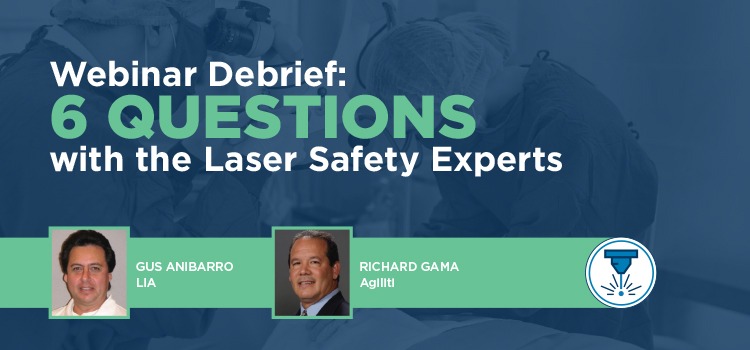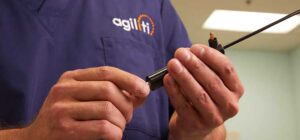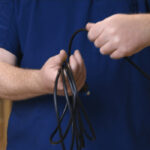During a recent webinar, Agiliti partnered with LIA to break down several key misunderstandings of the new ANSI standards related to medical laser safety in the OR. Part 2 of a 2-part series providing answers to some of the most pressing attendee questions.
Questions about building a laser safety program and staying in compliance with ANSI standards have been rolling in since Agiliti hosted our webinar entitled, “No Wizards Required! How to Demystify the Latest ANSI Standards and Improve Your Laser Safety Program.”
In the webinar, Gus Anibarro from The Laser Institute and Richard Gama of Agiliti had a lively discussion about requirements for laser safety officers (LSOs) and steps to immediately enhance a laser safety program.
In this blog post, we again asked Gus and Richard to weigh in on several additional questions from the webinar that pertain to LSOs and the updated ANSI standards.
Q: Should the laser safety officer be in on every surgical case?
Gus Anibarro: The LSO does not need to be on every surgical case. This is where the laser safety officer has the flexibility to appoint a deputy laser safety officer, laser safety site specialist or laser safety site contact. This laser safety site contact or site specialist is the eyes and ears for the LSO in the case.
Should the LSO be aware that a case is taking place? Yes. It’s important that they know it’s taking place. They also should train their laser safety site specialist as to what is the standard operating procedure to be followed for a particular case.
Q: Does the laser safety officer need to be an RN?
Gus: No, the laser safety officer does not have to be an RN. The ANSI standard, Z136.3, says you must have a laser safety officer, but it does not specify that the LSO is an RN. In some hospitals, the laser safety officer is the biomed technician. In others, it’s a surgical scrub tech.
What I typically find is that the laser safety officer in an operating room is a registered nurse. That may not be the case in a doctor’s office, for example, who is doing laser hair removal. The laser safety officer might be the doctor herself, or it could be an aesthetician. The standard provides flexibility to the employer as to who to appoint to be the LSO.
That said, there is a difference between a medical laser safety officer (MLSO) and a laser safety officer. Laser safety officers typically oversee non-medical applications, so manufacturing facilities, research labs, perhaps a construction site. We refer to this person as a Laser safety officer. But in the medical field we refer to the person in charge of laser safety as the medical laser safety officer. The MLSO is trained to work with medical cases, wherever a medical laser is used on a person.
Q: There are facilities that have a laser safety officer, but it’s only for title purposes. They do not get involved or have an established program. What can we do in order to get the facility LSO more involved?
Richard Gama: A laser safety officer in name only does nothing to administer and oversee the safety concerns associated with laser use. Facilities need to ensure that the LSO is directly involved in all aspects of the laser safety program. This individual should be given the authority to implement safety policies and to put a stop to unsafe behaviors and practices as they see fit in order to control laser hazards.
Q: Are there requirements by ANSI that physicians have to use lasers?
Richard: No, the Standard does not define a laser user as a physician. Instead, it must be a person who controls the application of the laser at the working area and is applying the laser to the patient for its intended purpose within the scope of practice, license, training and experience. This can vary from state to state, however. Some states do regulate that only a physician may apply a laser for patient care. Other states allow for non-physician providers to apply the laser, in some circumstances, under the supervision of a physician.
RECENT ARTICLE: Understanding ANSI: What New Standards Mean for Your Operating Room
Q: What training program do you suggest for a new laser safety officer who has no previous laser experience?
Gus: Find one that provides the foundation and the fundamentals needed to go back and implement a safety program. For the healthcare field, a medical laser safety officer course is what you want to look for, not a standard laser safety officer course. Why? Because the standard LSO training is not really the appropriate course for somebody who’s going to be a laser safety officer in a medical facility. In all other non-medical applications, the target of the laser is an inanimate object. In a medical application the target is human tissue – the patient. The LSO must have a good understanding of the hazards related to the medical lasers that will be used on the patient.
Richard: Tissue interactions along with all the safety and hazard information is a key component to a well-trained medical laser safety officer. Rockwell Laser Institute and the Laser Institute (LIA) are probably two of the premier organizations that really meet the spirit of the standard. You really want to make sure it’s focused on the ANSI standard. Ensure all the requirements within the standard for training of medical laser safety officers are met as well as a brief background in physics to understand how laser light works.
Q: How often should the medical laser safety officer retake a course or go through training?
Richard: The standards states that these courses should be taken at least every five years for laser users and operators, including medical laser safety officers. However, if you are a certified medical laser safety officer, the renewal cycle is every three years. It would be a good idea to go a little bit more on that frequency, especially for people who don’t have a strong background or experience in an operating room or surgical environment. Plus, if you’re certified, this training will give you credits towards your recertification, not to mention the networking and all the other information that you get exposed to when you attend these courses.
To find out more about creating your own laser safety program or ensure your facility is in compliance with the 2018 ANSI standards, watch Gus and Richard’s full webinar here.
Visit our Resource Center to discover more, or return to the blog menu.












